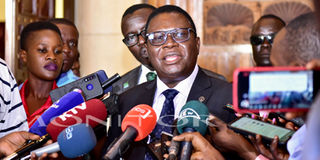Prime
What awaits Mao at new ministry

Newly appointed Minister for Justice and Constitutional Affairs Norbert Mao after the vetting process at Parliament on July 22. PHOTO / DAVID LUBOWA
What you need to know:
- President Museveni congratulated Mr Mao and expressed confidence that his “vast leadership experience will be instrumental in the unity we seek as a country and the solutions we desire for our people.”
Days after his appointment as Justice and Constitutional Affairs Minister, DP president general Norbert Mao was on Wednesday sworn into office to begin what promises to be a controversial reign.
President Museveni congratulated Mr Mao and expressed confidence that his “vast leadership experience will be instrumental in the unity we seek as a country and the solutions we desire for our people.”
In a statement issued by State House on Wednesday, Mr Museveni said the new relationship with Mao underpins NRM’s inclusive approach to politics.
“My job is to bring them back. I am glad that some people have come back, including Beti Kamya, Jimmy Akena and now Mao. It is a deliberate effort to unite and solve the problems of Uganda because we all have the same problems like improving roads, water, education security etc. The only difference is the opportunist politicians who don’t want to see a stable country,” he said.
The new Minister-in-charge of Economic Monitoring, Ms Beatrice Akello, was also sworn in at a ceremony officiated by the Head of Public Service and Secretary to Cabinet, Ms Lucy Nakyobe Mbonye.
In an interview with Daily Monitor after he was sworn in at State House Entebbe, Mr Mao was reluctant to delve in the details of what his time at the ministry is likely to look like, referring us to the cooperation agreement.
One element in the agreement that stands out is amendment of the term of Parliament.
The agreement also outlines the recommendations of the Supreme Court on electoral reforms, recommendations made to the Legal and Parliamentary Affairs Committee on constitutional reforms and the length of the Parliamentary term.
There have been proposals to extend the term of Parliament from five to seven years. Other duties include; development of laws, and Cabinet Papers.
Mr Mao and his team may not have so much room to deviate from the position of NRM except on matters that are not covered by the positions granted to them in the cooperation agreement.
According to the agreement, ministers from DP must support Cabinet decisions in their portfolio areas.
It is not clear how Mr Mao will handle some of the provisions that require cooperation of the DP MPs.
Mao is already facing rebellion from the majority DP MPs who have publicly expressed disagreement.
For example DP and NRM agreed on a ‘no surprises’ approach to new private Members’ Bills and the DP is required to back the NRM government on procedural motions in the House and in committees.
ALSO READ: I will work for all Ugandans, says Mao
“The Minister of Justice and Constitutional Affairs will be the lead minister for coordinating the National Dialogue and the whole of government response on Constitutional reforms with the mandate to coordinate Budget proposals in the Justice Law and Order Sector,” the cooperation agreement reads.
This means Mr Mao will take the lead in the Justice, Law and Order Sectors, which include Ministry of Justice and Constitutional Affairs, Judiciary, Ministry of Internal Affairs, Uganda Police Force, Office of the Director of Public Prosecutions, Uganda Prisons Service and Uganda Human Rights Commission.
Mr Mao and his colleagues are also required to advance shared goals in respect to the Executive and parliamentary activities, including any public statements.
President Museveni, per the agreement, may “from time-to-time issue letters of expectations to ministers and other officials from the DP and these letters will reflect the areas of policy cooperation and consultation processes required.”
Mr Mao added that the national dialogue is aimed at allowing the building blocks of Uganda ‘‘to come together and craft a new consensus on how we can live together in peace.”
“The building blocks include communities, traditional institutions, political parties, religious bodies, civil societies, and people in the diaspora,” he said.
Mao says
Mr Norbert Mao said he would start with the national dialogue.
“National dialogue and reconciliation both require laws and we already have a proclamation with President Museveni on national dialogue and then the National Transition Justice Policy and what we need to do is to actualise those provisions through appropriate laws,” he said. Mr Mao said it is his duty to persuade the President to embrace the agenda and thereafter get the approval of the Cabinet and then Parliament comes in to approve the necessary laws.
“Since we are dealing with institutions of the state, what matters most is whether Ugandans will appreciate what I will do because the procedures for passing laws are the same whether you’re the minister or MP,” he said
Mr Mao added: “What has changed now is that I will be speaking as the government minister and this means I will have the backing of the government and there is absolutely no contradiction because we are doing something which has not been done before in Uganda”.




